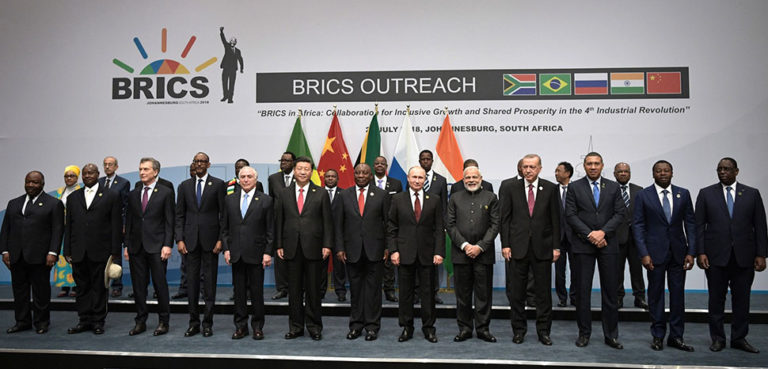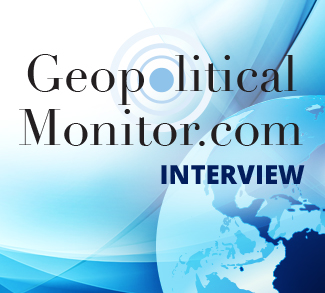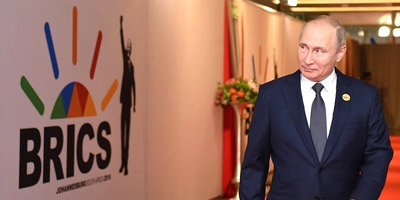Kazakhstan has become an important economic player in Eurasia, with impressive growth since gaining independence in 1991. The country is the largest economy in Central Asia, driven by its abundant natural resources and economic liberalization. Its GDP reached almost $260 billion in 2023, up from just $11.3 billion in 1993. With vast reserves of oil, gas, minerals, and critical raw materials. Kazakhstan has attracted significant foreign investment, contributing to its rise as an emerging economic powerhouse in the region. These factors have made Kazakhstan a desired candidate for joining BRICS (Brazil, Russia, India, China, and South Africa), as its economic success aligns with the organization’s focus on fostering cooperation among developing nations with high growth potential.
In recent years, discussions around Kazakhstan’s potential accession to BRICS have gained traction, with both China and Russia showing support for the country’s bid. However, on October 16, Kazakh President Kassym-Jomart Tokayev’s spokesperson, Berik Uali, announced that Kazakhstan will most likely refrain from submitting an application to BRICS, at least in the near future. This decision, while somewhat surprising given the recent expansion of BRICS, reflects Kazakhstan’s broader foreign policy goals.
Maintaining Neutrality and a Balanced Foreign Policy
One of the primary reasons behind Astana’s decision lies in its support for the United Nations as the leading international body governing global affairs. President Tokayev has regularly emphasized that the UN Charter must serve as the foundation of international law, highlighting the importance of adhering to its principles to ensure a just global order. Speaking at the Astana Think Tank Forum on October 17, President Tokayev stated, “I am firmly convinced that the United Nations must be strengthened because it is irreplaceable. While the UN has many shortcomings, we have no alternative. Therefore, Kazakhstan intends to continue cooperating with all countries that share this position on strengthening the UN’s role. The voices of regional and middle powers must be heard, particularly in the Security Council. The Security Council also needs reform, as it is currently in a deadlock, from which we must find a way out.”
Peace-focused Kazakhstan’s foreign policy, anchored in multilateralism, aligns with the mission and values of the UN. The country positions itself as a neutral platform for negotiations between conflicting sides, as seen in its role in the Astana Process, which facilitated discussions on the Syrian civil war. More recently, Kazakhstan hosted negotiations between Azerbaijan and Armenia in Almaty. If Kazakhstan were to align too closely with BRICS, its ability to mediate between conflicting parties could be compromised, particularly given the geopolitical dynamics of BRICS.
Kazakhstan’s geographical position, sandwiched between major powers like China and Russia, requires a careful balancing act. The country has adopted what it describes as a “balanced and pragmatic” approach to diplomacy, engaging with both Western and Eastern powers without aligning too closely with any single bloc.
Joining BRICS could tilt Kazakhstan’s foreign policy too heavily towards an alignment with China and Russia. Such a shift could risk alienating Kazakhstan’s other strategic partners, including the United States and the European Union, with whom it has developed strong trade and diplomatic relations. By refraining from BRICS membership, Kazakhstan can continue to navigate its delicate position between East and West.
Not a Snub to China and Russia
At the same time, Kazakhstan’s decision on BRICS membership should not be seen as a rejection of its relationships with China and Russia. On the contrary, Kazakhstan enjoys robust economic and trade ties with both countries. In 2023, Kazakhstan’s trade with China reached a record $41 billion, a significant jump from previous years and a 32% increase over 2022. This economic surge is a result of ongoing investment projects, with 45 joint ventures between Kazakhstan and China worth over $14.5 billion across key sectors such as energy, green economy, and infrastructure. Additionally, 2022 and 2023 have been record years for Russia-Kazakhstan economic cooperation, with trade at $26 and $27 billion respectively. Almost half of all foreign companies working in Kazakhstan are Russian and energy interdependence between the two countries is growing. Last year, a $6 billion deal was announced which will see Russia build three coal plants in Kazakhstan.
President Tokayev has frequently called for enhancing relations with both China and Russia. Kazakhstan is also a member of other regional organizations that include both states, such as the Shanghai Cooperation Organization (SCO) and the Conference on Interaction and Confidence-Building Measures in Asia (CICA). It’s also a founding member of the Eurasian Economic Union (EAEU), together with Russia and several other member-states. These platforms provide ample opportunities for Kazakhstan to cooperate with China and Russia on regional security and economic development, without the need to formally join BRICS.
From a broader geopolitical perspective, Kazakhstan’s decision to refrain from joining BRICS could be seen as a strategic move to prevent the organization from becoming overly weighted by Eurasian countries. BRICS, originally conceived as a grouping of emerging economies from diverse regions, risks losing its global balance if it were to include Kazakhstan, another Eurasian country in addition to Russia and China. Belarus is hoping to join the organization after the BRICS Summit in Kazan on October 24. Such a shift could undermine BRICS’ credibility as a truly global structure, detracting from its ability to represent a broad spectrum of emerging nations.
Kazakhstan’s location at the crossroads of Asia and Europe gives it a unique role to facilitate trade and cooperation between the two continents, including through projects such as China’s Belt and Road Initiative (the New Silk Road) and the Trans-Caspian International Transport Route (TITR), which starts from Southeast Asia and China, and runs through Kazakhstan, the Caspian Sea, Azerbaijan, Georgia and further to European countries.
By not joining BRICS at this stage, Kazakhstan preserves its ability to engage with a diverse range of international partners, allowing it to continue playing a balancing act between competing powers in Eurasia.
A Pragmatic Decision
Ultimately, Kazakhstan’s decision on BRICS is pragmatic. While the Central Asian country enjoys strong trade and economic ties with both China and Russia, joining BRICS could compromise its position as a neutral state in global affairs. Moreover, Kazakhstan’s membership in regional organizations such as the SCO, CICA, and the EAEU ensures that it can continue to cooperate with China, Russia and other member-states on regional issues without the need to join BRICS.
Kazakhstan will remain engaged with BRICS in an outreach capacity. President Tokayev plans to participate in an extended BRICS Summit meeting in Kazan next week. Yet it won’t pursue a full membership – a strategy that allows it to sustain its careful diplomatic equilibrium.
Professor Michael Rossi is a faculty member in the Department of Political Science at Long Island University, USA, and Director of the International Studies Program. He is also a University Instructor at Rutgers University, USA.
The views expressed in this article belong to the author(s) alone and do not necessarily reflect those of Geopoliticalmonitor.com.




